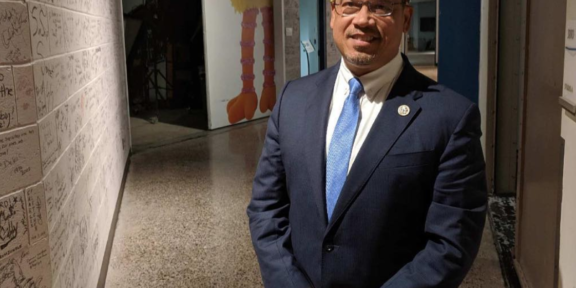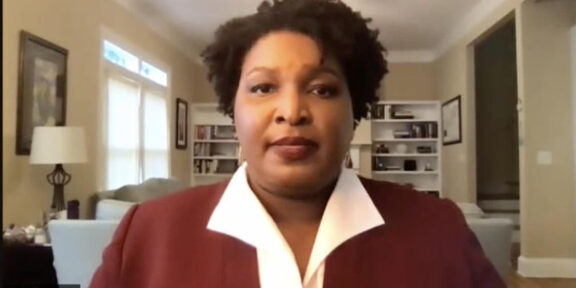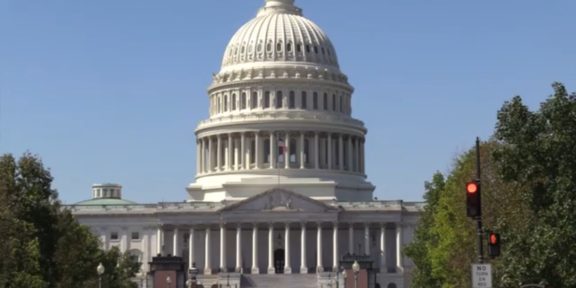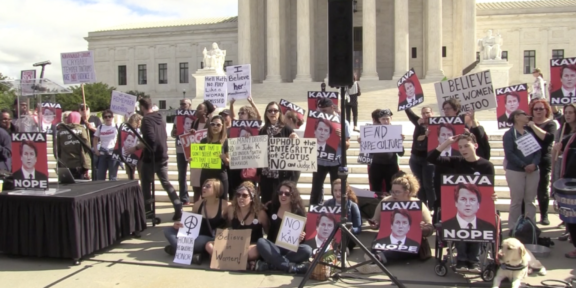WOODBRIDGE, Va. – President Obama jogs up to a roaring crowd, sprinkled with signs reading “Forward” and the faint rumblings of chants echoing “four more years!”
He grins, then clasps his hands together and swings them from side to side as if going up to bat.
“On a day like today, this is not a bad place to be … out in the ballpark,” he says to a packed Pfitzner Stadium under clear blue skies.
Wasting little time at the grassroots campaign stop, Obama went straight to addressing the latest campaign topic: the recently released recordings of former Gov. Mitt Romney’s comments at a fundraising dinner in May. The GOP presidential candidate said that 47 percent of voters think of themselves as “victims … dependent upon government” and that it is not his job to “worry about them.”
“I don’t believe we can get very far with leaders who write off half of the nation as a bunch of victims,” Obama said. “I don’t see a lot of victims in this crowd today.”
And the rest of the speech followed along those same lines — the president standing on a stage between the home plate and third base of the Potomac Nationals, swinging for his opponent.
For Virginians like Amy Rivera, who waited in line since 9 a.m. to make it to the rally, Romney’s “47 percent” stance only further confirmed her suspicions.
“He is an idiot,” she said. “He’s completely out of touch with what the people want.”
Rivera wants to see that the middle class is taken care of, something the president has been working on, she says.
“We succeed when folks at the top are doing well, but also when folks in the middle and people trying to get in the middle are doing well,” Obama said.
In a recent study, 49 percent of Americans surveyed identify themselves as “middle class,” according to the Pew Research Center.
Along with job creation, the solution to looking after the “middle” lies in education, Obama said.
“Education is the gateway of opportunity,” he said. “It was for me. It was for Michelle. It’s the gateway for many of you. It’s the gateway to a middle class life.”
The president stressed the importance of cutting the costs of college education with a time-worn anecdote about a child’s “dream deferred” because of the cost of tuition.
“Let’s work with colleges and universities to cut the growth of tuition costs, because we don’t want our young people loaded up with debt,” he said.
It’s a story that is all too real for Rashila Petteway, a Virginian and recent graduate of George Mason University.
Petteway, who studied art and visual technology, is now a freelance designer.
“Debt over my head is scary,” she said. Petteway used the consolidation program, which allows students to combine their loans to one bill, lowering their payments but extending the repayment period. She said it helped ease the financial burden.
Even with the plan, which came as an executive order in 2011, Petteway says the transition has been difficult.
As he listens to his daughter talk about her experience, Malcolm Petteway nods, agreeing with the hardships of sending his two daughters to college. He’s also had to factor in caring for his mother and mother-in-law, emphasizing his concern about the persistence of resources like Medicare and Medicaid.
It’s one of the many reasons why the nation cannot afford to be inactive during the upcoming election, he said.
“We can’t afford to get complacent; There’s too much at stake.”
The story of the Petteways reads much like those of many of the close to 10,000 people at the rally. When asked where they are from, most point behind the stadium and say “just down the road” in Prince William County. Many were the same people who watched as then Sen. Barack Obama made promises of change in 2008 and then voted for him, helping Obama become the first Democrat to win the battleground state in 44 years. They are the people who plan to vote to make sure history repeats itself in November.
Hafsatou Wann’s story is different.
Seven years ago, Wann traveled from Guinea to the United States and now studies business administration at Northern Virginia Community College. Her son screams whenever he sees Obama on television and even has a letter he wrote to the president that he’s debating to mail off.
Because of immigration reasons, Wann won’t be able to vote in this election.
“If I could vote for (Obama), I would,” the mother of three says.
But what about the people who are able to vote? Will Obama’s 14 visits to Virginia this election season prove successful, let alone pull a victory for the country?
In a closing nod to the uncertain road ahead in the election, the president assured the country that his commitment would not waver.
“I don’t know how many people are going to vote for me this time around,” he said. “But I’m telling the American people I will be fighting for you no matter what. I will be your president no matter what.”
Christina Downs is editor-in-chief of The Hilltop at Howard University.






